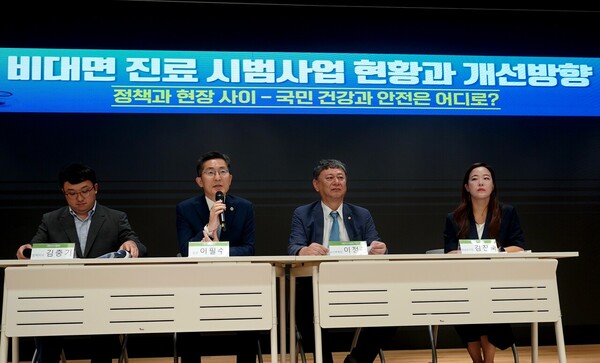
In response to mounting calls for institutionalizing non-face-to-face treatment, Korean doctors stressed that two preconditions be met – “no telemedicine for first-time treatment” and “clarifying the whereabouts of legal responsibility.”
The Korean Medical Association (KMA) made these and other points at Monday's news conference.
The association also unveiled the results of a survey on doctors concerning non-face-to-face treatment. KMA conducted the online opinion poll on 643 doctors, including in-depth interviews with 10 physicians, from July 24 to Aug. 6.
Of the 643 respondents, 316, or 49.1 percent, participated in the pilot telemedicine program, while 327, or 50.9 percent, did not. Physicians who participated in the pilot project cited patient demand as the primary reason for their participation, with many saying it was a new way to deliver care. Physicians who did not participate in the program said it was not proven safe and there was no immunity from liability.
Participants cited the benefits of virtual visits as an alternative for patients who cannot visit a doctor's office, but 42.4 percent did not feel that they provided sufficient care. In particular, 60.6 percent found identifying patients for virtual care most uncomfortable.
They called for improving the pilot program by, for instance, clarifying legal responsibilities (36.1 percent) and reducing the target and scope of telemedicine (22.1 percent). If the pilot program is improved in these ways, 31.1 percent of physicians who are not participating said they would participate.
Regarding allowing telemedicine for first-time treatment, 45 percent said the government should never permit it. Only 11 percent said it should be allowed for first-time and repeat treatments. Thirty-eight percent preferred to allow second-time treatment and permit first-time care only under unavoidable circumstances. In allowing second-time treatment, 49 percent said patients should have been seen within the past three months (in terms of chronically ill patients), while 66 percent said it would be inappropriate if the interval reached a year.
Regarding legal responsibility, 88 percent said doctors should be exempted from liability for medical accidents or medical errors caused by factors beyond their control, such as information and communication technology. If legal responsibility becomes clear in this way, 61 percent said they would participate in virtual care. Even 38 percent of doctors who did not participate in the pilot program expressed intention to participate.
Asked about the appropriateness of higher payment for virtual care than in-person treatment, 49 percent said it was inappropriate.
Besides, 52 percent said drug delivery should be allowed, and 30 percent said it should not.
In-depth interviews echoed similar sentiments.
Based on such results, KMA called for narrowing the scope of non-face-to-face treatment and disallowing night and holiday treatment and pediatric telemedicine care.
It also called for prohibiting telemedicine using telephones while obligating video consultation systems and strengthening the management of non-face-to-face consultation platforms.
Medical institutions that participated in both the chronic disease management pilot project and the non-face-to-face care pilot project also cited their inability to apply for duplicated reimbursement as a problem to be solved.
"It is impossible to provide non-face-to-face care for first-time patients, threatening public health and the national medical system. The principle that non-face-to-face medical treatment should be used to supplement face-to-face medical treatment must be observed,” KMA President Lee Pil-soo said. "It is also essential to 'clarify legal responsibility' for medical accidents or errors that inevitably occur during non-face-to-face medical treatment. This should be the priority when discussing the institutionalization of non-contact medical care."
Lee called for strengthening the management and supervision of illegal activities by non-face-to-face medical intermediary platforms and devising management and regulatory measures on platform companies.
He added that regulations should be strengthened to prevent side effects and illegal activities, including the exaggerated advertising of medical platforms, luring first-time patients, and reckless misuse of medicines.
"The government must make thorough evaluation and safety verification of non-face-to-face medical treatment pilot project for the past three years before institutionalizing it," Lee said. "As a healthcare professional organization, we will continue to discuss closely with the government and the National Assembly to protect people's right to health and create a stable medical environment instead of unconditionally opposing non-face-to-face medical treatment."

